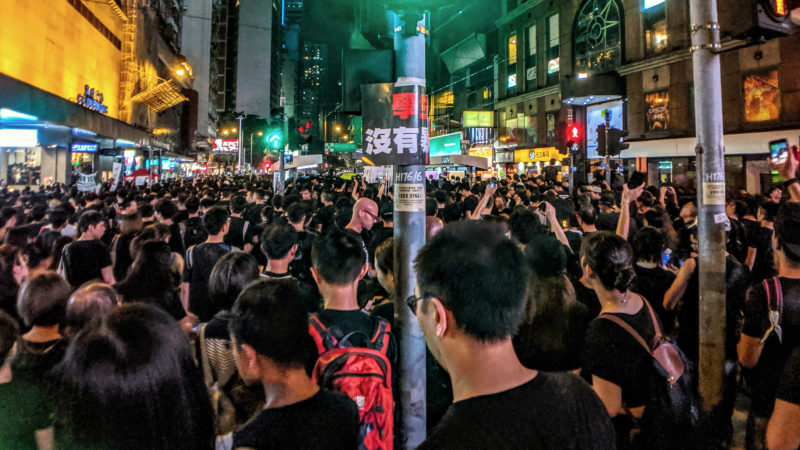
Over the last two weeks the Hong Kong police, supported by the Beijing government, have violently attacked pro-democracy protesters. On one particularly gruesome day, tear gas was released in an underground station following a sit in. Rubber bullets have been fired from close range at protesters’ heads – leading to bloody images on social media – and witnesses reported police officers standing by idly while hired hitmen beat up innocent demonstrators. Three police officers were arrested after a video appeared to show them beating a 62-year-old man in hospital last month. But no amount of police violence has stopped the demonstrators turning out in their thousands.
For British Chinese people like me, Hong Kong has always held a special place in my heart. Hong Kong is a wonderfully chaotic mix of Cantonese traditions and soaring hi-tech development, and despite high levels of inequality and corporate power it can claim to be one of the few metropolises in Asia to boast a truly free press, independent judiciary and incorruptible government. This success is underpinned by the “one country, two systems” principle, which allows Hong Kong to retain its free political life after sovereignty was transferred to China from Britain in 1997.
The recent protests have resulted from a series of increasing encroachments on Hong Kong’s political freedoms from Beijing. Most prominent is the proposed extradition bill, which would allow Beijing to bypass Hong Kong’s independent courts at will and extradite suspects to mainland China, where they are unlikely to face a fair trial.
Opposition to the extradition bill led literally millions of largely peaceful protesters to take to the streets. But following the police brutality and ongoing silence of HK’s chief executive, Carrie Lam, the protests have become far more than opposition to the extradition bill. Many see it as their last chance to save what remains of Hong Kong’s imperfect but largely democratic system. Protestors know that should they fail this time they could face decades in prison and some have turned to suicide as their only way out. A city stands on the precipice, a generation awaits their fate.
Despite the enormity of these protests for not just China but the whole world, you could be forgiven for thinking the British left are not even aware of them. Responses from Labour members and politicians alike have ranged from the bizarre to the inadequate. Indeed, some have fallen into the trap of propaganda from Beijing. One Labour activist tweeted that they’d sooner believe reports from the Chinese ‘working class’ than capitalist sources, seemingly unaware that the People’s Daily is an elite funded propaganda machine so brazen it makes Russia Today look balanced.
While Tom Watson’s message of solidarity was well received by protestors in Hong Kong, it failed to press for any substantial action from the British government. John McDonnell stopped short of supporting the BNO campaign – a simple administrative change to the status of British Nationals Overseas passport holders which would immediately grant protection to thousands of Hong Kongers. Most deafening of all is the silence of Jeremy Corbyn, who is yet to make a single statement on the issue. A leader who has an admirable record for consistently voicing the concerns of oppressed people across the globe has allowed this injustice to pass him by.
The left has long had a blind spot when it comes to China. Many are well versed in the failings of Stalinism but have yet to fully grasp the historical atrocities of Maoism. The light manner in which John McDonnell used Mao’s Little Red Book to score a cheap point in the House of Commons reveals this ignorance – a book which represents an ideology which killed tens of millions through dogmatic crusade and famine.
Perhaps part of the left’s mistake arises from a false belief that China is a socialist country. This could not be further from the truth. China’s state driven capitalism has led to inequality and environmental catastrophe. The Chinese ‘Communist’ Party shuts down Marxist discussion groups and routinely arrests trade union leaders. History repeatedly teaches us that socialism without democracy is not socialism at all.
The next few weeks are critical for the future of Hong Kong. As the only other signatory of the Sino-British Joint Declaration, which underlies HK’s autonomy, Britain finds itself in a unique position to apply pressure on Beijing. It was a grave error typical of colonial racial hierarchy not to grant full citizenship rights to Hong Kongers with BNO passports, and now is the time to correct this injustice. The Conservative Party’s ear to China will always be more attuned to the interests of big business than the freedoms of ordinary Hong Kongers. Now is the time for Labour to stand up for Hong Kong. When will Jeremy Corbyn break the silence?




More from LabourList
‘Council Tax shouldn’t punish those who have the least or those we owe the most’
Two-thirds of Labour members say government has made too many policy U-turns, poll reveals
‘Two states, one future: five steps on the path to peace for Israelis and Palestinians’